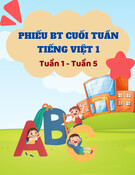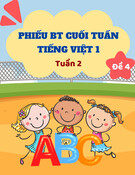
ENGLISH 11 (GRAMMAR AND EXERCISES) By Ms. Thuy (0942.587.666)
Full name: ………………………………
Date: 10.10.2021
WRITTEN TEST 20 (UNIT 5)
ENGLISH 11
Marks
Ch ký ph huynhữ ụ ………………
Direct speech and Reported speech
I. Definition:
1. L i nói tr c ti pờ ự ế : là s l p l i chính xác nh ng t c a ng i nói.ự ặ ạ ữ ừ ủ ườ
- L i nói tr c ti p đc đt trong d u ngo c kép và sau đng t chính có d u ph y(,) ho c d u hai ờ ự ế ượ ặ ấ ặ ộ ừ ấ ẩ ặ ấ
ch m(:).ấ
- Đôi khi m nh đ chính cũng có th đt sau l i nói tr c ti p.ệ ề ể ặ ờ ự ế
Ex: “ I don’t like this party” Bill said.
2. L i nói gián ti p (indirect/reported speech)ờ ế là l i t ng thu t l i ý c a ng i nói, đôi khi không c nờ ườ ậ ạ ủ ườ ầ
ph i dung đúng nh ng t c a ng i nói.ả ữ ừ ủ ườ
Ex: Bill said that he didn’t like that party.
II. Nh ng thay đi trong l i nói gián ti p:ữ ổ ờ ế
1. Thay đi đng tổ ộ ừ: Thì c a các ủđng tộ ừ trong l i nói gián ti p thay đi theo m t nguyên t c chungờ ế ổ ộ ắ
là lùi v quá kh (các thì xu ng c p):ề ứ ố ấ
Direct Speech Reported Speech
1. Present Simple:V1
Ex1: Nam said “I am told to be at school before
7 o’clock”
Ex2: He said “ I like beer”
2. Present Progressive: am/is/are +Ving
Ex: He said “I’m watching TV”
3. Present Perfect: has/have + V3/ed
Ex: He said “ I have just bought a new book”
4. Past Simple: V2/ed
Ex: They said “ We came by car ”
5. Past Progressive: was/were + V-ing
Ex: He said “I was sitting in the park at 8
o’clock”
1. Past Simple:V2/ed
EX1: Nam said (that) he was told to be at school
before 7 o’clock.
Ex2: He said (that) He liked beer
2. Past Progressive:was/were+Ving
Ex: He said (that) he was watching TV
3. Past Perfect: had + V3/ed
Ex: He said (that) I had just bought a new book
4. Past Perfect: had + V3/ed
Ex: They said (that) they had come by car
5. was/were+V-ing or Past Perfect progressive
Ex:-He said ( that ) he was sitting in the park at 8
o’clock”
- He said ( that )he had been sitting in the park
at 8 o’clock”
1

ENGLISH 11 (GRAMMAR AND EXERCISES) By Ms. Thuy (0942.587.666)
6. Past Perfect: had + V3/ed
Ex: She said “ My money had run out”
7. Future Simple: will +V without to (V0)
Ex: Lan said “I’ll phone you”
8. can
Ex: He said “ you can sit here”
9. may
Ex: Mary said “I may go to Ha noi again”
10. must
Ex: He said “I must finish this report”
6. Past Perfect: had + V3/ed
Ex: She said ( that) her money had run out
7. would + V without to ( Vo)
Ex: Lan said ( that) she would phone me
8. could
Ex : He said ( that) we could sit there
9. might
Ex: Mary said ( that) shemight go to Ha noi
again
10. must/ had to
Ex: He said ( that)he had to finish that report
* Chú ý: M t s tr ng h p không đi thì c a đng t trong câu gián ti p:ộ ố ườ ợ ổ ủ ộ ừ ế
- N u đng t m nh đ gi i thi u đc dùng thì hi n t i đn, hi n t i ti p di n, hi n t i hoànế ộ ừ ở ệ ề ớ ệ ượ ở ệ ạ ơ ệ ạ ế ễ ệ ạ
thành ho c t ng lai đn, thì c a đng t trong câu gián ti p v n không thay điặ ươ ơ ủ ộ ừ ế ẫ ổ
Eg: He says/ he is saying/ he has said/ he will say, “the text is difficult”.
He says/ is saying/ has said/ will say (that) the text is difficult.
- Khi câu nói tr c ti p th hi n m t chân lý ho c m t hành đng l p l i th ng xuyên, thì c a đng tự ế ể ệ ộ ặ ộ ộ ặ ạ ườ ủ ộ ừ
trong câu gián ti p v n không thay điế ẫ ổ
Eg: My teacher said “The sun rises in the East”
My teacher said (that) the sun rises in the East.
He said, ‘My father always drinks coffee after dinner’
He said (that) his father always drinks coffee after dinner
- Câu tr c ti p có d ng câu đi u ki n lo i 2 ho c lo i 3:ự ế ạ ề ệ ạ ặ ạ
Eg: He said; “If I knew her address, I would write to her”
He said that he would write to her If he knew her address
Eg: She said, “If I had enough money, I would buy a new bicycle.”
She said (that) if she had enough money, she would buy a new bicycle.
Eg: The teacher said, “If John had studied harder, he wouldn’t have failed his exam.”
The teacher said (that) if John had studied harder, he wouldn’t have failed his exam.
Tuy nhiên n u l i nói tr c ti p là câu đi u hi n lo i 1 thì đc chuy n sang lo i 2 l i nói gián ti pế ờ ự ế ề ệ ạ ượ ể ạ ở ờ ế
Eg: The advertisement said; “If you answer the questions correctly, you may win one million dollar”
The advertisement said that I might win one million dollar If I answered the questions correctly.
- Không thay đi thì c a m nh đ sau “wish’ổ ủ ệ ề
Eg: He said; “I wish I had a lot of money”
He wishes (that) he had a lot of money
- Không thay đi thì c a m nh đ sau “It’s (high/ about) time”ổ ủ ệ ề
Eg: She said; “It’s about time you went to bed; children”
2

ENGLISH 11 (GRAMMAR AND EXERCISES) By Ms. Thuy (0942.587.666)
She told her children that It’s about time they went to bed
- Không thay đi thì c a m nh đ đi sau ‘would rather, would sooner”ổ ủ ệ ề
Eg: She said; “I would rather you stayed at home”
She said that she would rather I stayed at hone
- Không thay đi thì c a:ổ ủ
Could, would, might, should
Ought, had better, need trong câu nói gián ti p ế
Nh ng must -> had to/ mustư
Eg: She said; “I could do the homework
She said the she could do the homework
- Đng t trong câu nói tr c ti p có th i gian xác đnh:ộ ừ ự ế ờ ị
Eg: He said, “I was born in 1980”
he said that he was born in 1980.
- M nh đ tr ng ng ch th i gian trong câu ph c có thì quá kh đn và quá kh ti p di nệ ề ạ ữ ỉ ờ ứ ứ ơ ứ ế ễ
Eg: “I saw him when he was going to the cinema”
She said she saw him when she was going to the cinema
2. Thay đi v đi t nhân x ng, đi t s h u, tính t s h u:ổ ề ạ ừ ư ạ ừ ở ữ ừ ở ữ
Đi t nhân x ngạ ừ ư
Ch ng ủ ữ
Tân ngữ
Tr c ti pự ế gián ti pế
Me Him/ her
us Them
you Them/ him/ her
Tính t s h uừ ở ữ
Tr c ti pự ế Gián ti pế
my His/ her
our Their
your Their/ his/her/ my
Đi t s h uạ ừ ở ữ
Tr c ti pự ế Gián ti pế
mine Him/ hers
ours Theirs
yours Theirs/ his/ hers
3. Thay đi v t ch th i gian và n i ch n:ổ ề ừ ỉ ờ ơ ố
Tr c ti pự ế Gián ti pế
Today/ tonight that day/ that night
3
Tr c ti pự ế Gián ti pế
I He, she
we they
You They/ he/ she/ I

ENGLISH 11 (GRAMMAR AND EXERCISES) By Ms. Thuy (0942.587.666)
Yesterday the day before/ the previous day
last month/ night … the month before / the previous month/ night
Tomorrow the following day/ the next day
this moth that month
The day before yesterday two days before
The day after tomorrow in two days’ time
next month the month after / the following month
Here there
Now then
Ago before
This that
These those
III. Nh ng thay đi c th trong t ng lo i câu trong l i nói gián ti pữ ổ ụ ể ừ ạ ờ ế
1. Câu tr n thu t trong l i nói gián ti p: (Statements in reported speech)ầ ậ ờ ế
S + said (to + O) + that S + V……
S + told + O + that S + V….
Eg: ‘We will have a test tomorrow’, My teacher said.
-> My teacher said (that) they would have a test the next day.
*Note: Có th s d ng m t s ĐT d n sau: thought, announced, explained, complained, believed…ể ử ụ ộ ố ẫ
2. Câu h i trong l i nói gián ti p (Questions in reported speech)ỏ ờ ế
Chó ý: Khi chuy n câu h i tr c ti p thành gián ti p cũng c n áp d ng qui t c chuy n đi trên,ể ỏ ự ế ế ầ ụ ắ ể ổ
ngoài ra c n thay đi:ầ ổ
-Đng t t ng thu t câu h i gián ti p là asked/ wanted to know/ wondered ( t h i)ộ ừ ườ ậ ỏ ế ự ỏ
-Tr t t t chuy n v d ng tr n thu t t c là ch ng đng tr c đng t và không có tr đng tậ ự ừ ể ề ạ ầ ậ ứ ủ ữ ứ ướ ộ ừ ợ ộ ừ
-Không dùng liên t “that’, d u “?” đc b điừ ấ ượ ỏ
a. Yes/ no questions:
S + asked + ( O ) + if / whether + clause
Eg: Tuan asked Ba “Are you fond of watching television?”
Tuan asked Ba if/whether he was fond of watching television
b. Wh-questions:
S + asked + (O) + wh - word + clause
Eg: He said to me, “Why did you go with her father last week?”
He asked me why I had gone with her father the week before.
Chú ý: Trong tr ng h p câu tr c ti p có c câu tr n thu t và câu h i khi đi sang câu gián ti pườ ợ ự ế ả ầ ậ ỏ ổ ế
ph n nào v n c đi ph n yầ ẫ ứ ầ ấ
Eg: “ I have left my watch at home. Can you tell me the time?”
He said that he had left his watch at home and asked me if I could tell him the time
3. Câu m nh l nh trong l i nói gián ti p (Imperative in reported speech)ệ ệ ờ ế
(+) He/ she + ordered + object + to infinitive
commanded
told
asked
requested
4

ENGLISH 11 (GRAMMAR AND EXERCISES) By Ms. Thuy (0942.587.666)
Eg: “Please wait for a minute.” The man asked me
The man asked me to wait for a minute.
“Would you mind opening the door” she asked me.
She asked me to open the door.
He said to the waiter, “ Please bring me some hot water.”
He told to the waiter to bring him some hot water.
I said to her “Please shut the window.”
I asked her to shut the window.
(-) He/ she + ordered + object not to + infinitive
told
asked
Eg: “ Please don’t talk loudly”.
He asked me not to talk loudly.
He said “Don’t shut the door”.
He asked me not to shut the door.
4. Câu c m thán trong l i nói gián ti p: (Exclamationin reported speech)ả ờ ế
- Đng t t ng thu t là: exclaim/shout ộ ừ ườ ậ
Eg: He said, “ What a lovely garden they have”
He exclaimed that they had a lovely garden.
- Các hình th c c m thán b t đu b ng “what’ và “how” chuy n sang gián ti p b ng:ứ ả ắ ầ ằ ể ế ằ
He said that it was … / ho c He exclaimed that it was …ặ
Eg1: She said; “What a pity!” (Direct speech) -> She exclaimed that it was a pity
Eg2: I said; “What a nice horse” -> I exclaimed that it was a nice hoese
Eg3: He said; “How beautiful she is!”-> He exclaimed that she was beautiful!
Eg4: “What a big egg” he said -> He said that it was a big egg.
Eg5: “ How dreadful!” he said -> He exclaimed that it was dreadful.
5. Reported speech with to infinitive
a. Đ ngh , l i m i:ề ị ờ ờ
S + invite + (O) + to V …
S + offer + to V …
Ex: He said, “Would you like to go out for a drink?”
---> He invited me to go out for a drink.
She said to me; “How about some coffee”
-> She invited me some coffee
“I will look after the house for you if you like” he said.
-> He offered to look after the house for me if I liked.
* Ta s d ng “ Would you like to V... / How about …/ Why don’t you + … đ m i ử ụ ể ờ
Eg: Why don’t you come to my village to have a day off?
* Offer: - Would you like me to V
- Shall I do.../ Can I…? Could I …?
- I’ll do … if you like
Eg: Can I help you with the dishes? Shall I shut the door?
Would you like a drink? Would you like to come for a meal?
b. Yêu c u: (đng t t ng thu t ask)ầ ộ ừ ườ ậ
5



![Tài liệu tham khảo Tiếng Anh lớp 8 [mới nhất/hay nhất/chuẩn nhất]](https://cdn.tailieu.vn/images/document/thumbnail/2025/20250806/anhvan.knndl.htc@gmail.com/135x160/54311754535084.jpg)










![Phiếu bài tập cuối tuần Tiếng Việt 1 tuần 2 đề 2: [Hướng dẫn chi tiết]](https://cdn.tailieu.vn/images/document/thumbnail/2025/20250728/thanhha01/135x160/42951755577464.jpg)

